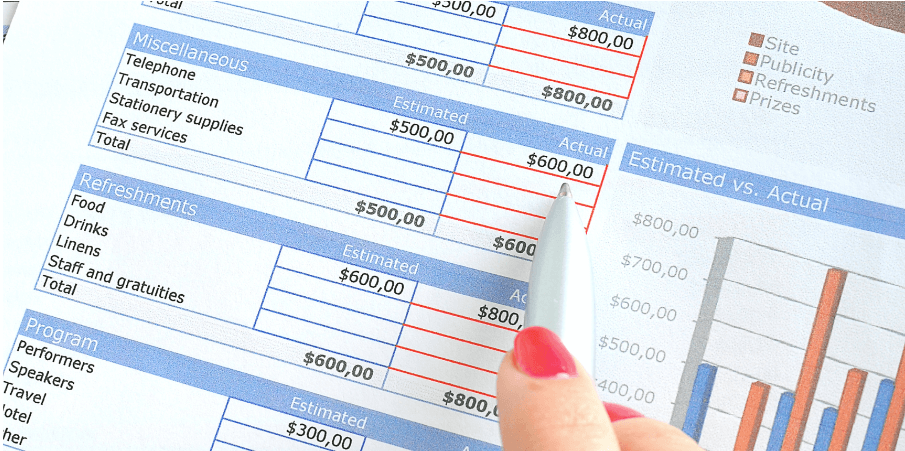
Money Talks: Defining an Event Budget
Imagine purchasing tickets to a highly-anticipated event promising exclusive talks with podcast celebrities and a panel with the actors from Supernatural and Harry Potter. Now, imagine showing up to the event, hearing that most speakers backed out after not getting paid, and then being asked to help cover the costs of the event’s outstanding hotel bill of $17,000.
It sounds like a nightmare, but that was the reality for DashCon 2014, an event where attendees paid witness to one of the most important lessons in event planning – don’t bust the budget.
This lesson has become increasingly difficult as things get more expensive. According to a recent Maritz Industry Trends Report, most meeting expenses are up over 20 percent since before the pandemic. But, most budgets haven’t budged. Instead, event planners are living within the constraints and are more reliant on proper planning and financial forecasting to ensure the success of their events.
Why event budgets are important
A budget serves as a financial blueprint for a successful event, aligning expenses with desired outcomes and ensuring financial viability.
A clearly defined budget provides a framework for decision-making, enabling event organizers to strategically allocate resources. By delineating expenses across various categories such as venue, marketing, and entertainment, budgets help prioritize spending for maximum impact. This foresight prevents overspending and optimizes funds in areas that help organizers reach their goals.
Event budgets also act as a risk management tool. By estimating costs and revenue streams beforehand, budgets help identify possible financial gaps. This enables organizers to devise backup plans, forge partnerships, and negotiate favorable deals with vendors to ensure that the event stays on track throughout planning and execution.
The basics of event budgeting
Crafting an event budget demands meticulous planning, attention to detail, and adaptability. To create a robust budget that meets financial constraints and aligns with the event’s goals, start with the basics:
- Establish event objectives. Outline the event’s purpose, goals, and expected outcomes. These aspects influence every budgetary decision.
- Research and forecast needs. Gather information on the event’s requirements to estimate expenses accurately. Consider previous similar events, industry standards, and projected costs.
- Identify sources of revenue. Forecast potential funds coming in from ticket sales, sponsorships, merchandise, or donations to establish a baseline for your budget.
- Understand expenses. Break down, prioritize, and allocate expenses into categories such as venue, catering, marketing, staffing, technology, permits, etc.
- Set up a contingency fund. Set aside 10-20% of the total budget to buffer any unforeseen expenses or emergencies.
When event organizers have a solid understanding of the basics, they’ll know if it is possible for the event to happen or not.

Nine steps to crafting a comprehensive event budget
1. Start Early
Organizing a financial game plan early on puts power in the hands of the event organizer and alleviates stress throughout planning. An early start means more time to shop around for bargains, establish partnerships and negotiate with vendors. Whereas, starting too late can mean less options and premium rates.
2. Create a Spreadsheet
Event organizers must stay organized. Creating a spreadsheet or utilizing relevant event software will help categorize and itemize costs, estimate expenses and revenue, and track spending.
Tools like Google Sheets or Microsoft Excel offer budgeting templates with formulas that make calculating expenses against income easy. When modifying or building a spreadsheet, event organizers should include categories such as:
- Administrative expenses, such as ticketing, registration or accreditation
- Communications and marketing spends
- Vendor costs, including food and beverage, entertainment, photography, AV, cleaning, security, decorations, speakers, etc
- Staffing needs
- On-site expenses and material needs, such as printing costs, wifi, restrooms, transportation, etc.
3. Prioritize Expenses
Some items, such as venue, catering and entertainment are sure to come with a higher price tag. So, it’s important event organizers have a firm grip on what will give them the most bang for their buck, or the biggest return on their investment. This is where understanding event objectives and overarching goals plays a pivotal role.
“We don’t have the luxury of doing anything and everything that we want anymore because of the state of the economy and the state of the industry right now. So you have to be even more strategic about where you put those dollars and what you do with them to make the most impact,” Jitter Garcia, vp-event marketing and brand experiences at TelevisaUnivision, told Event Marketer.
4. Research and Negotiate with Vendors
A request for proposal (RFP) is an important document used to communicate needs and expectations to vendors in order to receive a quote for the services provided. Creating one requires a good understanding of the event’s requirements and goals.
As quotes are collected, event organizers should track them within their budgeting spreadsheet to easily view and compare prices. This provides a general understanding of the competitive cost for services provided and gives organizers negotiating power when following up with top vendor choices. For example, if a preferred vendor comes in at a higher cost but is available for multiple events throughout the year, the organizer may negotiate bulk pricing or long-term contract for a lower rate.
5. Consider How to Cut Costs
Beyond using competitive knowledge and relationships to negotiate with vendors, event organizers should consider other ways to reduce spending. This may include keeping event planning and management in-house – unless it interferes with other organization priorities.
“In-house teams bring a level of efficiency and cost-effectiveness that is hard to match. They can streamline processes, negotiate better with vendors, and leverage existing relationships. Their continuity and familiarity with their brand lead to better planning, execution, and crisis management,” Chaviva Gordon-Bennett writes in an article for Bizzabo.
To further reduce spending, organizers can leverage free social media and email marketing tools, as well as utilize the power of word-of-mouth from partners or loyal audiences. If hosting multiple events, spending can also be limited by digitizing signage or handouts or choosing evergreen banners or swag that excludes dates or specific event information.
6. Identify Sponsors and Partners
Sponsors and partners play a major role in event production. With funding and support from outside organizations, event organizers are able to save money on event production, attract new audiences and realize important or elevated aspects of their event.
However, this requires careful research and conversations. Attracting these types of partnerships requires an understanding of the marketing value of the event, as well as the values in which the organization or event may align with the prospective partner.
7. Charge for Value-Adds
Outside of ticket revenue and sponsorship dollars, event organizers can create many other avenues to generate revenue at their events. Consider:
- Event merchandise
- Drink tickets
- Meal tickets
- Upgraded seating
- Access to content after the event
- Fast passes for check-in
- Passes for multiple or exclusive sessions
- VIP ticket packages or ticket bundles that combine experiences and services
8. Track Expenses and Revenue
The budget spreadsheet is not just a tool used for initial planning. Instead, event organizers should reference it throughout the planning process, updating actual expenses and incoming revenue as it occurs to ensure their event is on track. Keeping a pulse on the budget allows organizers to make adjustments accordingly. For example, if revenue from ticket sales seems low, an event organizer may choose to run a limited-time promotion to boost sales and generate more buzz.
Did you know? With Ticketbud, event organizers can access ticket funds early to cover early event costs. Learn more at ticketbud.com.
9. Report on Performance
Any person or organization that invested time or money into producing an event will be curious about its overall success. Event organizers can utilize the data tracked in their spreadsheet to produce performance reports related to the event, its budget, and any revenue or marketing value gained.
Demonstrating ROI is of the utmost importance of maintaining stakeholder trust and ensuring an event can be reproduced in the future.
Keys to effective event budgeting
“To get the best value from long-awaited meetings and events and mitigate against rising costs, corporations will need to plan further in advance, budget carefully, and adopt a disciplined approach to managing meetings and events across the organization,”
– Beau Ballin, global head market development, CWT Meetings & Events, told skift meetings.
Events are only getting more expensive. Dedicating time to formulate a well-thought-out budget in the early stages of the planning will avoid problems from planning through production.